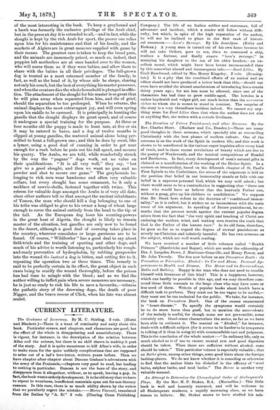The Duration of Future Punishment, and other Sermons. By the
Rev. Charles Short. (Mathew and Co., Dundee.)—There are many good thoughts in these sermons, which specially aim at reconciling Christianity with the best phases of modern culture. One of the sermons is on the work of the Spirit in modern life, and this work is shown to be manifested in the various eager inquiries after every kind of truth, and in those recent revelations of beauty which are due to the poetry of Wordsworth, and the musical compositions of Handel and Beethoven. In fact, every development of man's natural gifts is claimed as a manifestation of the working of the Divine Spirit. In a sermon on immortality, based on the fifteenth chapter of St. Paul's First Epistle to the Corinthians, the stress of the argument is laid on the position that belief in our immortality stands or falls with our belief in a supreme personal God, which we may well admit ; but there would seem to be a contradiction in suggesting that " there are men who would have us believe that the heavenly Father can, without a pang, give up his children to annihilation." We suppose that Mr. Short here refers to the doctrine of "conditional immor- tality," as it is called, but it strikes ns as inconsistent with the main tenor of his argument. In speaking of future punishment, he re- marks that the present revolt against the current popular dogma arises from the fact that "the very spirit and teaching of Christ are embuing the modern mind, and making men receive the truth that God is the Father of the human race." In its old form, therefore, he goes so far as to regard the dogma of eternal punishment as utterly un-Christian and infinitely harmful. He has two sermons on the subject, which are well worth reading.


































 Previous page
Previous page